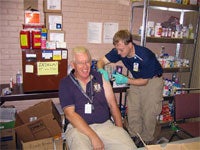
Re-Deployed Sept. 28 for second tour, now assisting Rita victims
KINGSTON, R.I. — October 12, 2005 — As the vehicle plowed through 3 feet of water, Jeffrey Bratberg saw a body on an interstate highway. At night he slept in an abandoned bar and used toilet paper as a pillow. His showers consisted of wiping his body down with moisturized baby wipes.
But after completing his first tour, the assistant professor of pharmacy at the University of Rhode Island didn’t hesitate when asked if he would return to New Orleans or go to some other area of the United States battered by a natural disaster. “I would go again,” said the Cranston resident who was part of the 35-member Rhode Island Disaster Medical Assistance Team that was deployed to Louisiana to assist victims of Hurricane Katrina. “It was one of the most important things I have ever done and I didn’t want to leave.”
Well, Bratberg got his chance to return to Louisiana when he was re-deployed to Lafayette with the Rhode Island team on Sept. 28. He was first deployed Aug. 29 and stayed for two weeks. He will return from his second deployment, Monday, Oct. 17.
In his fourth year at URI, Bratberg is an infectious diseases specialist at Rhode Island Hospital and at Brown Medical School, as well as a Rhode Island Department of Health consultant on the process of dispensing medications in the event of a bioterrorism event. He was invited to join the disaster team and was called to respond to Florida last year.
He talked about his first tour in the Gulf just days before he got his second call.
“I couldn’t go (to Florida) last year because I was in the middle of my teaching duties, and this year a few weeks before Katrina, I was called again. First, I said no, but then I saw this giant hurricane and realized my students could get by without me for a little while.”
His first stop was in Camp Shelby, Miss. and then the team moved on to Baton Rouge. He worked with Megan Sliney, a URI pharmacy grad and chief pharmacist of the team.
“We then got the call to go the Superdome, but we had seen the news and we weren’t going anywhere that wasn’t safe. We decided to go after the National Guard responded.
“I remember going over the Huey Long Bridge and seeing the Mississippi River on fire, and helicopters filling the sky. I’ve seen tornadoes and I helped sandbag the flooding Red River in North Dakota, but this was inexplicable.”
Bratberg was in New Orleans three years ago for a conference on infectious disease and to return after it had been destroyed was almost more than he could comprehend.
“I’ve seen military personnel with machine guns in Europe after the first Gulf War, but to see it here, this militaristic environment, was amazing. There were these giant Chinook helicopters in the air all the time.”
Bratberg and the disaster team set up their operation in a basketball arena across from the Superdome. “We walked in and the National Guard was treating all these people in cots.”
Bratberg said the need was so great and the demands so extreme that “I have no memory of what I did in my first four hours there.”
He said the team’s main goal was to provide primary care for those with illnesses and injuries related to the storm and those with chronic conditions who had been without medication for days. “We treated people with seizure disorders, injuries related to being in the contaminated water, such as bacterial infections and those who were victims of violence. I treated a man who had been stabbed in the eye while trying to board a bus.”
While tending to the victims, the team coped with 100-plus degree heat and their own members getting sick. “Members of the team got diarrhea and many of the National Guard members didn’t have their own medications because they responded so quickly.”
Through it all, Bratberg was struck by the courage and grace of the victims. “We had basic supplies like food and water, but these people, who had nothing, were immensely grateful. Every one of them would look you in the eye and say, ‘God bless you.’”
He learned that his infectious disease training was critical during his time in New Orleans. “I realized that we all needed plenty of waterless hand sanitizer because there was no water. The day we got portable toilets we said we were living in luxury.”
In some cases, he and his team did not have the medicines that people needed, so they dispensed medication substitutions. “You come away from it asking questions that will be important for the future, such as, ‘What do I need to be prepared?’”
Bratberg grabbed his flashlight for the trip down, but realized when he got there he needed batteries. “Here at the College of Pharmacy, I teach my students to do the best patient assessments, so they can prescribe the best medicine for the condition. In New Orleans you have to list priorities because you might actually run out of medicine.”
After spending two-and-half days in New Orleans at the basketball arena, the team was relieved and sent east to Jefferson Hospital, which was clean, secure and had power. “I’ll never forget walking in there. The hospital chaplain was in there telling people to have hope, have faith.”
There, the team set up a clinic and immunized more than 1,000 people who were exposed to the flooding against such things as hepatitis and tetanus.
“One person in line asked how long it would take, and the team said it would be two-and-half hours. “To save my life, I will wait as long as I have to,” the patient told the team.
Media Contact: Dave Lavallee, 401-874-5862

